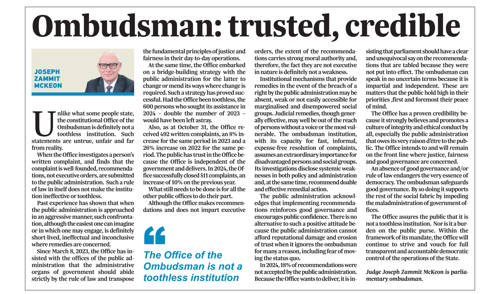The Ombudsman: trusted, credible
Date of article: 11/11/2024
Daily News of: 12/11/2024
Country:  Malta
Malta
Author:
Opinion Piece published on the Times on 11 November 2024
Unlike what some people state, the constitutional Office of the Ombudsman is definitely not a toothless institution. Such statements are untrue, unfair and far from reality.
When the Office investigates a person`s written complaint, and finds that the complaint is well-founded, recommendations not executive orders are submitted to the public administration. Such a rule of law in itself does not make the institution ineffective or toothless.
Past experience has shown that when the public administration is approached in an aggressive manner, such confrontation, although the easiest one can imagine or in which one may engage, is definitely short-lived, ineffectual and inconclusive where remedies are concerned.
Since the 8th March 2023, the Office has insisted with the offices of the public administration that the administrative organs of Government should abide strictly by the rule of law and transpose the fundamental principles of justice and fairness in their day-to-day operations.
At the same time, the Office embarked on a bridge-building strategy with the public administration for the latter to change or mend its ways where change is required. Such a strategy has proved successful.
Had the Office been toothless, the 600 persons who sought its assistance in 2024 – double the number of 2023 – would have been left astray.
Also as at the 31st October 2024, the Office received 492 written complaints, an 8% increase for the same period in 2023 and a 26% increase on 2022 for the same period.
The public has trust in the Office because the Office is independent of Government and delivers. In 2024, the Office successfully closed 511 complaints, an increase of 10% on the previous year.
What still needs to be done is for all the other public offices to do their part.
Although the Office makes recommendations and does not impart executive orders, the extent of the recommendations carries strong moral authority and therefore the fact that they are not executive in nature is definitely not a weakness. Institutional mechanisms that provide remedies in the event of the breach of a right by the public administration may be absent, weak, or not easily accessible for marginalized and disempowered social groups.
Judicial remedies, though generally effective, may well be out of the reach of persons without a voice or the most vulnerable. Consequently, the Ombudsman institution, with its capacity for fast, informal, expense free resolution of complaints assumes an extraordinary importance for disadvantaged persons and social groups. Its investigations disclose systemic weaknesses in both policy and administration and at the same time recommend doable and effective remedial action.
The public administration acknowledges that implementing recommendations reinforces good governance and encourages public confidence. Quite frankly there is no alternative to such a positive attitude because the public administration cannot afford reputational damage and erosion of trust when it ignores the Ombudsman for many a reason, including fear of moving the status quo.
In 2024, 18% of recommendations were not accepted by the public administration. Because the Office wants to deliver, it is insisting that Parliament should have a clear and unequivocal say on the recommendations that are tabled because they were not put into effect. The Ombudsman can speak in no uncertain terms because it is impartial and independent. These are matters that the public hold high in their priorities first and foremost their peace of mind.
Despite the opinion of some that it is toothless, the Office has a proven credibility, because it strongly believes and promotes a culture of integrity and ethical conduct by all, especially the public administration that owes its very raison d`etre to the public. The Office intends to and will remain on the front line where justice, fairness and good governance are concerned.
An absence of good governance and/or rule of law endangers the very essence of democracy. The Ombudsman safeguards good governance. By so doing it supports the rest of the social fabric by impeding the maladministration of government offices. The Office assures the public that it is not a toothless institution. Nor is it a burden on the public purse. Within the framework of its mandate, the Office will continue to strive and vouch for full transparent and accountable democratic control of the operations of the State.

![]()


